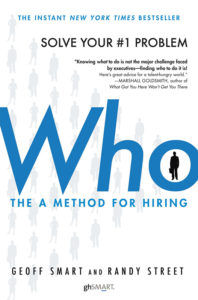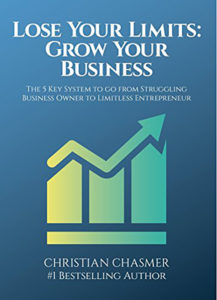


A lot of entrepreneurs struggle with growing their business because of limiting beliefs. They don’t think that they’re worthy enough of being a leader and hit that glass ceiling where they can’t get past. In this episode, host Nathan Hirsch talks with Christian Chasmer about his book, Lose Your Limits: Grow Your Business, Christian tackles the limiting beliefs that most business owner have that holds them back from growing their business. He also shares his entrepreneurial background and the challenges he encountered with building systems, hiring VAs, and building a team.
—
Listen to the podcast here:
[smart_track_player url=”https://www.podetize.com/statsapi/www.podetize.com/wp-content/uploads/fileuploads/11-5b145ef137b51b3d1af0633e9305c43d/12/2019/0e4a3dc0f55bdb5531eacd771bad320d.mp3″ title=”Growing Your Business Through Systems With Christian Chasmer” artist=”Nathan Hirsch” image=”https://freeup.net/wp-content/uploads/2019/04/OAS.png” ]
Download the audio file here.
Growing Your Business Through Systems With Christian Chasmer
My guest is Christian Chasmer. Christian, how are you doing?
I am doing fantastic, Nathan. Thanks for having me.
I’m excited to have you. For those of you who don’t know, Christian empowers entrepreneurs to build their businesses with systems that give them freedom. He works with CEOs and young people who are out to impact the world in a big way. At 26 years old, this young entrepreneur has already built two successful companies without sacrificing his lifestyle to stress and burnout. He’s all about the system, which is something that I like to know. I’m a big systems guy and we’re going to talk all about that. First, let’s take a gigantic step back. What were you like growing up as a kid? Were you a straight-A student? Were you a rebel? Did you always know you wanted to be an entrepreneur?

I was a straight-A student. I had good grades but I was also a rebel. My mom told me to get straight-A’s and get to college. That was about the only rule. I did that and then I partied and did all these other bad things as a teenager. I didn’t know I wanted to be an entrepreneur. I never even heard of an entrepreneur. I didn’t know any adults that read for leisure. I grew up in a small town. If you wanted to make money, you either became a banker or a lawyer then moved to New York City. I didn’t think that entrepreneurship was a thing that I could do.
Can you tell us more about your story? How did you go about going from someone that didn’t know anything about entrepreneurship to getting into it and starting your first company and then your second?
I went down to the University of South Carolina for college. I was on the pre-law track and doing my thing. I was a business student but I didn’t care about business. I was that party colleger. One day I came into a classroom and there was a piece of paper on my desk and it said, “Run your own business over the summer, make $10,000.” I had $30 to my name so I said, “Sign me up. I’ll do anything for $10,000 over the summer.” What it wound up being was a franchise opportunity where I ran my own exterior painting business over the summer.
I turned it down back in the day. I didn’t want to do it, but I’m familiar with what you’re talking about.
I did that. You knock on doors, you learn how to sell to customers, you hire your own painting crew, and then you run and manage your own painting crew over the summer. I call it the six-month learning how to run a business through the fire. You get thrown in and you learn how to run a business. After that summer, I realized that entrepreneurship was the way for me. I was obsessed with entrepreneurship. I also realized that I was a crappy entrepreneur and a bad manager at that time too. I needed to learn how to be a better person and I needed to learn how to systemize businesses.
What was your first real entrepreneur endeavor after the painting?
I did that second year down in college and then I moved up to Boston and started my own division of that company. We’re teaching college students how to do that and managing them to run their own branches. I and my partner up in Boston, we built that up to about $1.2 million in several months. From there, we said, “We understand how to build a thing from scratch, let’s do it on our own.” We left the student painter business and started our own real estate development company. That was the first fully on our own thing. We started out doing wholesales, knocking on doors and grinding because we left our jobs and bet all of our money on this business. We scaled that one up in a couple of years to about $6 million.
What ended up happening with that business?
I wound up systemizing it. I got obsessed with systemization. I built out the processes and a great team. I was able to move out to San Diego once the day-to-day operations were systemized. From there, I realized that I loved building businesses. I love helping entrepreneurs. I didn’t love real estate development that much but my partners did. I wound up selling my part in the business to my partners and some outside partners.
You talked about systems. What did that look like? Were you using Google Docs? Were you using different software? How did you go step-by-step in building those systems so other people can follow them?
A lot of people try to get fancy with the systems and they can use fancy software and there are tons of that. We got down and dirty with Google Docs and Asana and that’s what we use now as well. We started out by knocking on doors and then having sales interviews with people and then potentially buying their houses. We started systemizing that. We wrote down step-by-step exactly what we’re doing, what our scripts were and how we were tracking which was a Google Sheet. We’re tracking doors knocked on, contacts, appointments set up, etc. We started writing it out, scripting it out, systemizing it, and then taught college students how to do that. Once I got out of that part, I started learning how to systemize the actual flipping of houses, the development and the sourcing. We wrote down what we’re doing in Google Docs and started teaching it to other people whereby the end, we had college students banging on phones, calling agents, using our scripts, using our way of online sourcing properties and buying properties for us.
To be a good entrepreneur, you need to learn how to be a better person and how to systemize.
Why college kids? I always think college kids are a terrible investment. You invest a lot of time and it’s not their top priority. Why go that route instead of a VA or someone that’s not in college that knows it’s what they want to do? Did you even see that turnover that I’m talking about?
We were using VAs as well to scrape online lists, schedule calls, executive assistant type of stuff, organizing our documents and creating processes too. We would teach VAs how to create processes as well, where we would record it and they would type them out. We used college students because it’s what we knew in the beginning. We came from student painters where we were teaching college students how to run their own business. We had a different perspective on college students that given the right training and given the right responsibilities, they can surprise you and they can do amazing things because they want to learn. We got lucky or I guess it’s half luck, half system with our hiring process and finding the right college students to do the phone calls and the sourcing, but we did have some VAs as well doing the backend items.
Let’s talk about that hiring process. It took me a few years to come up with a good hiring process that I trust that a high percentage came out the other side would be good at and invest in. What did that process look like on your side?
One thing every company should do is be as transparent as possible with everything.
In our hiring process, we imitated a lot from the topgrading structure. Topgrading in the book Who by Geoff Smart. We took a lot of that. We use topgrading interview to go through the work history form, we always go with that. We did core value interviews. We had referral interviews which is something that everyone should do. We actually call the people’s references and we interviewed them with a structured set of questions to figure out one, is this person BS-ing us? You do get to find the truth. Two, which I found most important is I’m understanding how to coach them for when they get hired. Hearing about the other manager who used to manage them, you hear about strengths, you hear about weaknesses. We did take a lot from the Who format and then we sprinkled in our own couple of items as well.
You have all these people you’ve hired. You’ve got some VAs and college kids. How are you organizing that? Are there meetings? What does that culture look like? What’s going on after the hire, after you start implementing these systems?
We use Asana for our onboarding process. We have every single step in the onboarding process written out in Asana. I think that the first 30 to 60 days in a freelancer’s lifetime is one of the most important parts. Onboarding is super specced out. In terms of managing, we had our daily huddle so we would meet every single day at 9:00 AM and my team still does that. We would talk for fifteen minutes about what did you do yesterday? What are you doing today? What are your blockers? From there, we had a 90-minute weekly meeting, which models Traction by Gino Wickman/Scaling Up with Verne/my own stuff as well. That weekly meeting is mostly about issues and following up on our okay hours.

What are your biggest objectives and key results for the quarter? Where are you? What’s your confidence level? What are the big issues holding our business back? That was our meeting rhythm, plus we had quarterly off-sites and yearly off-sites as well, but that was the big meeting rhythm. We didn’t have too many other meetings besides that. One thing we did differently and I tried to do in every company is be as transparent as possible as well with everything. All the business challenges, all the ups, all the downs. We were honest and we relied on our team to understand our biggest challenges and make the right decisions from college students all the way to VA in the Philippines. Florence, one of my VAs, she knew everything that was going on in the business. She understood it. She was able to look at the P&L and figure out what was going on. I think that helped create a level of ownership in the company. I still try to do that in all of the companies I’ve ever involved with, which is create that transparency and that open book policy.
Do you have a bad hiring story or maybe your horror story that you can share with the audience?
There are a lot of hires that we thought were going to be great and then after two weeks, they fizzled out. They couldn’t handle the high pace and intensity. I had one hire that was bad back in my student painter days. He came on the team. It didn’t look like it was going to be a good fit but I needed painters. I was into grinds. That’s usually what happens, especially early on in your entrepreneurial career year. You think, “I just need a person, I’m going to skip the process. I’m not going to listen to my gut. I’m going to bring them on for bodies.” That never works out. I did that my first year as an entrepreneur, I brought them on. They were not great. They kept missing deadlines. They had a bad attitude, etc.

One day I walked on the job site and the person painted the gutters, which you’re not supposed to do. He painted the gutters because he was lazy. You’re supposed to cut around them. I asked him, “What are you doing? You’re painting the gutters.” I was specifically like, “That’s not what we do.” He looks up at me and he goes, “They look better this way.” I said, “Get off my job site. You’re done. You’re fired.” There’s a little exchange at that point. At that moment, I had to let him go. That was a big realization of bodies for the sake of bodies is not the case. You want to find A-players. I’d rather slow down to find the right people than to just bring people on. That was one of the lower points of my management career. I had my whole team leave me that year as well. The whole team left in one day. I had $50,000 still to produce and nobody to produce the work. That was also a pretty big low point for me.
How did you recover from that?
I knew I wasn’t going to quit, but I felt like a complete failure. Somebody I respected who used to do student painters, but now runs a $20 million logistics company. He said, “It’s funny that you’re in this position because you know you can’t fail. If you don’t quit, you can’t fail. I know you’re not a quitter, Christian.” That hit me in the face of like, “I can’t fail if I don’t quit.” I went back, I did the whole hiring process, found a whole team, trained the team with the whole training that I put on my own and finished out the work. It was a grind but it was a good lesson for me too.
Given the right training and the right responsibilities, college students can surprise you and do amazing things because they want to learn.
Let’s talk about your book, Lose Your Limits. I know a lot of entrepreneurs have those limiting beliefs. What do you see? You’re talking to entrepreneurs all the time, you’re coaching them and you’re helping them. Talk a little bit about that.
Limiting beliefs are a huge part of my life and still is. I think it’s a big limiter for everybody. It’s the belief that you’re not good enough. It’s the belief that you can fail. It’s the belief that people won’t like you if you go this certain way. Specifically to entrepreneurs, I see a lot of limiting beliefs around their capability. They don’t think that they’re worthy enough of being a leader. They bring themselves down a little bit which obviously puts growth on the business. It puts growth on them as a leader and capable of hiring and bringing on a team. I see that as a huge limiting belief a lot of times with entrepreneurs and that’s where they hit that glass ceiling where they can’t get past. A lot of entrepreneurs will hit that six-figure mark where they’re about to start bringing on a team and scale their company. There are a lot of limiting beliefs around the worthiness or the skill to bring that on and then at the $1 million mark, $2 million mark, etc.
What about people that are struggling to build systems or to hire to build a team. What advice would you have for them?
Start with one process. Start with the VA that you can pay for five hours a week and start small. Figure out one thing that you can delegate to them, whether that’s invoicing, whether that’s something extremely small. Create a video or document it in a Google Doc and then give a VA five hours a week, two hours a week for the first month. I see that all the time. People are so afraid to delegate that first task, but that’s what entrepreneurship is. You need other people. Entrepreneurship is a team sport. Start small and test.
Is there anything that I didn’t cover that you’d like to share?

I feel like we’re hitting the whole gamut here. I would reiterate what we talked about and Nathan, I know you preach this a lot about delegation using VAs, using executive assistants. My life completely has changed since I’ve gotten my executive assistant and I would never be without one, but not even an executive assistant, but any type of virtual assistant to do a lot of things. A lot of people say, “I wouldn’t know what I would delegate to them,” and that stops them from going on to FreeeUp. It stops them from creating those processes. Once you take that first step, take that test and write that first process, it unlocks a whole different door and a whole different idea of entrepreneurship and you go from a technician to a real entrepreneur.
Christian, this has been great. Where can people find out more about you? What are you most excited about for the rest of the year?
People can find me at ElevateYourSystems.com. They can head to the website or they can reach me on Facebook and LinkedIn as well, Christian Chasmer. What I’m most excited about is our company Elevate. We have a cool offering going that’s helping people build systems and processes and start to delegate and scale up their company. Every time a client tells me that their life has changed, they can go on vacation with their wife, they can do the things they want to do because they’re freeing up that time and they’re also able to make a bigger impact with their company. That’s what gets me going. We’ll continue to grow Elevate.
Christian, thanks so much for coming on.
Absolutely, Nathan. Have a great day.
Important Links:
- Christian Chasmer
- ElevateYourSystems.com
- Facebook – Christian Chasmer
- LinkedIn – Christian Chasmer
- Lose Your Limits
- Traction
- Scaling Up
- Who
- Asana
About Christian Chasmer
 Christian Chasmer empowers entrepreneurs to build their business with systems that will give them freedom. He works with CEO’s and young people who are out to impact the world in a big way..At 26 years old, this young entrepreneur has already built two successful companies without sacrificing his lifestyle to stress and burnout. He is all about system
Christian Chasmer empowers entrepreneurs to build their business with systems that will give them freedom. He works with CEO’s and young people who are out to impact the world in a big way..At 26 years old, this young entrepreneur has already built two successful companies without sacrificing his lifestyle to stress and burnout. He is all about system
Starting in college, Christian built a franchise from $0 to $1.2 million in annual revenue. He then co-founded the real estate development company CC Solutions and grew it to $6 million in revenue in under 2 years. To help others create the same satisfaction he’s found in life and business, Christian authored the bestseller Lose the Limits: Break your limiting beliefs, become a more productive you, and achieve everything you want in life.
Christian’s give-first mindset and skill for building systems help him fulfill his mission: to help others make an exponential impact and simplify business. He lives with his wife in San Diego, California.
